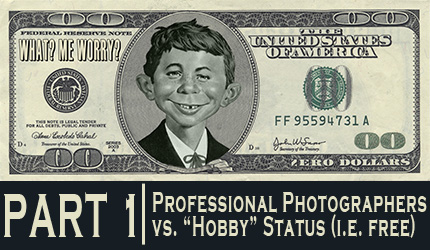Stock Industry Declines, Long Live Assignment Work
 I can honestly tell you that 10 to 15 years ago, I was making images that, as I was contemplating the work being done and efforts made, I was considering it nearly the same as putting a few dollars into my retirement account. "My stock is my retirement" I said more than once. Thankfully, I also have a real retirement account with real dollars growing in real time that will pay my real bills when I get older.
I can honestly tell you that 10 to 15 years ago, I was making images that, as I was contemplating the work being done and efforts made, I was considering it nearly the same as putting a few dollars into my retirement account. "My stock is my retirement" I said more than once. Thankfully, I also have a real retirement account with real dollars growing in real time that will pay my real bills when I get older.
Fortunately, there will always be assignment work - that much I can be sure of. As faces, styles, trends, and subjects age, new products announced, new and fresh images will need to be made. Clients can easily be convinced that they don't need "all rights forever", when you tell them "you (and your boss) won't want to use this portrait after two or three years. You'll be tired of seeing it, so why pay for a license that extends beyond what you really need?" That tact - an honest and true assessment of the real likelihood of the situation - is a very convincing one. True too as buildings are built and need to be photographed, news breaks and needs covering, and plights and despair need documenting.
Stock photography, on the other hand, as operated by corporations bent on record profits every quarter, is in decline. That does not mean that photography is in decline, just one aspect of it. Segments of markets decline over time. Consider albums to cassettes, to CD's, yet music and musicians live on.
Dan Heller does an excellent job (almost all the time) of writing treatise after treatise on the business of photography. Long and detailed insights are a worthwhile read, yet every time I write a piece that's a bit lengthy, I get comments privately that the piece is too long, or needs to be broken up. Studies have shown that articles in USA Today, Time, and so forth can't be too long for todays reader, as they will tune out. So, this is more of an overview and light commentary than anything else.
Alamy reports in their latest quarterly statement that revenues are down, which will no doubt be offset by their increase in the percentage of each sale they take from you. a21 filed for bankruptcy, and Jupiter is being acquired by Getty for a fraction of what they were worth just a year or two ago. And, Getty is worth a fraction of what it once was, hence it is now in the hands of private investors, and the shoe will likely drop on staff cuts in January, as the ramp-up to a breakup follows in the coming year.
To continue the slashing of overhead, as PDN reports, "Newsweek, NPR Cutting back", and they are not alone. PDN also reports on New York Newsday with this piece about everyone having to reapply for their jobs - no doubt at a lower salary, and NPPA suggests that the department will be slashed by two-thirds from 20 to 7, and in the PDN piece there's a link there to a previous piece about other cuts. Staff jobs everywhere continue to be slashed, and you can expect cuts from Tribune, and others, as bankruptcy looms and cost-cutting devastates once robust newsrooms.
So, what to do?
Rely on yourself. Freelance, my friends. If you fail, you will have no one to blame by yourself. Is it hard? Absolutely, from time to time. But once you get the ball rolling, it is highly rewarding. There are short-cuts, but they are losing propositions. Using someone elses' work and pawning it off as your own, licensing images as work-for-hire without really knowing what they will do with the photo places you in such a disadvantageous position that it is 99.9% of the time, a really really bad idea because, invariably, you get the short end of the deal. Having a poorly done website is the same as walking into a business meeting with a conference room table full of suits, wearing jeans and a t-shirt, and expecting respect. You won't get it, or, you won't get a chance to demonstrate your genius which, if you could have, would have overcome your wardrobe selection for the day. No one will click on the "Contact Us" link if your website looks like crap. These, and the many other short-cuts are all along the path to failure, littered with the evidence of highly talented photographers who failed to heed the warnings of solid business and marketing practices as being an integral and critical part of longevity in this business.
To succeed, you must arm yourself with the knowledge you are currently lacking. Step 1 of a well-known 12-step program is to first admit you have a problem. So too, in this instance, you must admit there are certain things you don't know. You don't have to admit them in a circle at a meeting - just to yourself, and then commit to learning what you need to. "Know what you don't know", I say often to people when speaking on this subject. Get my book, or ASMP's, or Dan Heller's book. Read any of the books on the right-side of this article, and head off in the right direction.
Assignment work - for those that remain in business - will be around for a very long time. In a race to the bottom, stock licensing will continue to decline not just on a per-license basis, but also in the revenue per image category, as categories continue to be flooded with imagery, watering down the marketplace even further. While my day-to-day operating budget has never been based upon revenues from stock, I do re-license my images. Earlier this week, an existing client extended a license from a PR rights package to a marketing use, generating $1k in additional revenue from the assignment. This is not unusual. But remember, it came from an assignment.
Please post your comments by clicking the link below. If you've got questions, please pose them in our Photo Business Forum Flickr Group Discussion Threads.













